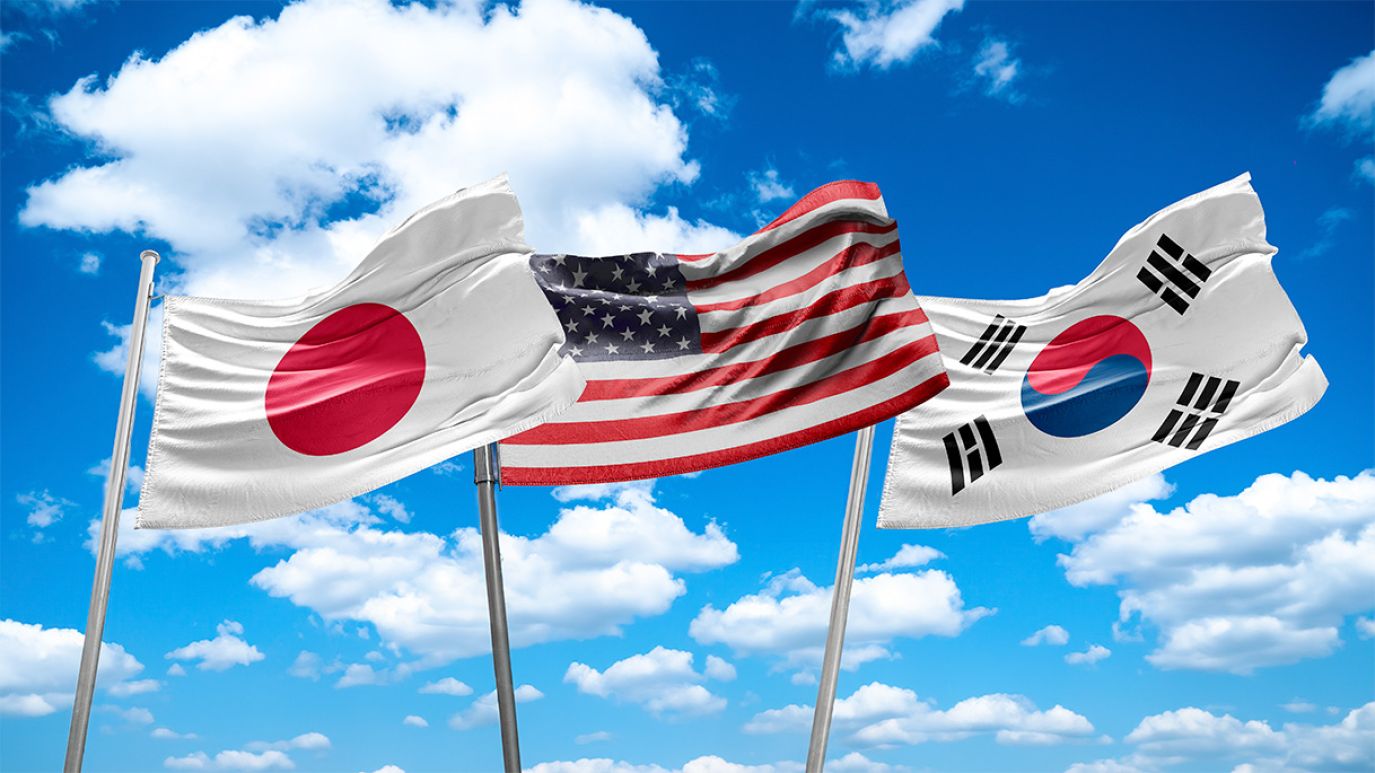Camp David – An unprecedented trilateral partnership

On 18 August, the three leaders of the US, Japan, and South Korea convened at Camp David in Maryland and agreed an unprecedented trilateral partnership that, according to them, “advances the security and prosperity of our people, the Indo-Pacific region, and the world.”
At first glance, the Camp David Summit held 18 August 2023 in Maryland resulted in a clear trilateral framework formed to more closely coordinate and curtail China’s intended economic and technological expansion. However, given the recent history between the Republic of Korea (ROK/South Korea) and Japan, it marks a significant feat of global diplomacy. But it could also change the face of global geopolitics.
The partnership came about for two key reasons. First, South Korean president Yoon Suk Yeol has made significant efforts to improve relations with Japan, despite it being an unpopular foreign policy approach at home. Second, Russia’s invasion of Ukraine, China’s increased assertiveness against Taiwan, and North Korea’s unending nuclear campaign has made this trilateral partnership a matter of geostrategic necessity.
Spirit of Camp David
The outcome of the meeting between President Biden, President Yoon, and Japanese Prime Minister Fumio Kishida resulted in a globally significant signed joint statement. Referred to as the “Spirit of Camp David” (SCD), the statement covered some major issues in the Indo-Pacific region.
The leaders stated, “We share concerns about actions, inconsistent with the rules- based international order, which undermine regional peace and prosperity.” Regarding China, SCD specifically addressed two issues:
- Taiwan: “We reaffirm the importance of peace and stability across the Taiwan Strait as an indispensable element of security and prosperity in the international community. There is no change in our basic positions on Taiwan, and we call for a peaceful resolution of cross-Strait issues.”
- South China Sea: SCD criticized China’s “dangerous and aggressive behavior supporting unlawful maritime claims” and said, “we strongly oppose any unilateral attempts to change the status quo in the waters of the Indo- Pacific. In particular, we steadfastly oppose the militarization of reclaimed features; the dangerous use of coast guard and maritime militia vessels; and coercive activities. In addition, we are concerned about illegal, unreported, and unregulated fishing. We reiterate our firm commitment to international law, including the freedom of navigation and overflight, as reflected in the UN Convention on the Law of the Sea (UNCLOS).”
The aim of the partnership has little room for misinterpretation, as stated in ‘The Spirit of Camp David: Joint Statement of Japan, the Republic of Korea, and the United States’[1]:
“Today, we declare openly that we are united in a common purpose to strengthen our shared region. Our mandate is to ensure Japan, the Republic of Korea, and the United States are aligned in our objectives and in our actions, generating the common capacity required to ensure that the Indo-Pacific is thriving, connected, resilient, stable, and secure. Ours is a partnership built not just for our people but for the entire Indo-Pacific.”
Mixed reactions
However, the implications run much deeper. For example, the agreement drew mixed reactions in South Korea, largely based on fear of potential retaliatory reactions from the North Korea–Russia–China axis, although the historical significance of enhanced Seoul-Tokyo relations was understandably hailed. At the same time, there is concern in the ROK about being drawn into Japan’s security issues with China. In the same vein, commentators in Japan are concerned about how China might respond.
However, PM Kishida emphasized his “strong feeling” about strengthening Japan-ROK relations, which bodes well for the durability of this trilateral partnership. Of course, for the US it strengthens its position in trying to minimize tensions in the Indo-Pacific region through two strategic allies.
Unsurprisingly, China reacted strongly against the Camp David Summit. On 21 August China’s Foreign Ministry said, the summit “smeared and attacked China on Taiwan and maritime issues — an act of gross interference in China’s internal affairs, a deliberate attempt to sow discord between China and our neighbors, and a serious violation of norms in international relations. China deplores and strongly opposes this and has made solemn démarches to relevant parties.”
Chinese government-run media went further, describing it as a “battle call for a new Cold War” and a “watershed for block confrontation.” They warned the new trilateral partnership will make Japan, particularly South Korea, less safe.
Pamir’s view
Pamir considers that, while the trilateral partnership is a significant coup for the three allies, and particularly for ROK-Japan relations, there could be long-term regional ramifications.
For example, it may prompt North Korea, Russia, and China to build stronger economic, intelligence, and military ties in response, with possibly more aid being provided by China to North Korea.
Significantly, it could mean that ASEAN countries may compelled to choose between the US (ROK and Japan) and China (North Korea and Russia), which could further accelerate the semblance of geopolitical polarization currently unfolding.
[1] https://www.whitehouse.gov/briefing-room/statements-releases/2023/08/18/the-spirit-of-camp-david-joint-statement-of-japan-the-republic-of-korea-and-the-united-states/
China’s 5G influence in developing economies
China’s Belt and Road Initiative and its digital counterpart, the Digital Silk Road, threaten to displace US telecom and tech companies in developing economies in Africa, Latin America and the Middle East. How can US operators and network providers stand up to the challenge?